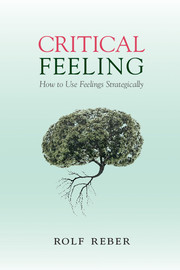Book contents
- Frontmatter
- Dedication
- Contents
- Preface
- Part I The basics of critical feeling
- Part II Applications of critical feeling
- 4 Happiness through critical feeling
- 5 The role of sensory and bodily feedback
- 6 Living together
- 7 Critical feeling in business and politics
- 8 Critical feelings at school
- 9 Music, art, and literature
- 10 Religion and morality
- Epilogue
- Notes
- References
- Index
4 - Happiness through critical feeling
from Part II - Applications of critical feeling
Published online by Cambridge University Press: 05 March 2016
- Frontmatter
- Dedication
- Contents
- Preface
- Part I The basics of critical feeling
- Part II Applications of critical feeling
- 4 Happiness through critical feeling
- 5 The role of sensory and bodily feedback
- 6 Living together
- 7 Critical feeling in business and politics
- 8 Critical feelings at school
- 9 Music, art, and literature
- 10 Religion and morality
- Epilogue
- Notes
- References
- Index
Summary
I have now reigned above fifty years in victory or peace; beloved by my subjects, dreaded by my enemies, and respected by my allies. Riches and honour, power and pleasure, have waited on my call, nor does any earthly blessing appear to have been wanting to my felicity. In this situation, I have diligently numbered the days of pure and genuine happiness which have fallen to my lot: they amount to FOURTEEN.
(Caliph Abdulrahman III, who reigned at Cordova in the tenth century ce; cited in Gibbon 1995/1788, p. 346)Well-being as a goal in itself has been propagated at least since Epicurus (341–270 bce). He stated that a good life is a life of happiness, tranquility, and peace; a life that is free of worry, fear, and pain (Epicurus 2012). Pleasure and pain are the direct measures of such a life: The more pleasure and the less pain, the better. Epicurean philosophy does not go beyond pleasure and pain – that is, expected utility for oneself – to measure well-being. Such an egocentric notion of well-being is seen as deficient by most authors (see, for example, Spranger 1928/1914). Modern philosophical approaches therefore extended the notion of happiness for oneself to the earlier mentioned notion of the greatest happiness for the greatest number (Bentham 1988/1776). Yet this approach would not claim that we have to suffer pain and give up happiness beyond the needs of the well-being of society. Even most religious communities do not require their believers to voluntarily suffer. Ascetic life and self-castigation are accepted only, if at all, as exercises that harden body and spirit in order to be better able to serve society, while suffering for suffering's sake is commonly seen as meaningless in the West (e.g., Noddings 2003). In order to be capable members of society, we have a duty to look for our well-being, which includes both good health and happiness. Toward the end of this chapter, I review research on the positive effects of happiness. Regular experience of positive emotions makes people more broadly attentive, resourceful, and social (see Fredrickson 2013); individuals become better suited to cope with loss (see Bonanno 2004; Kaltman and Bonanno 2003) and to meet the challenges of pursuing social and societal values (Fredrickson 2013).
- Type
- Chapter
- Information
- Critical FeelingHow to Use Feelings Strategically, pp. 103 - 127Publisher: Cambridge University PressPrint publication year: 2016

